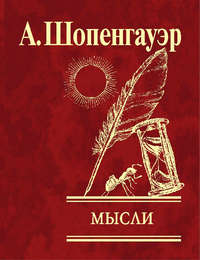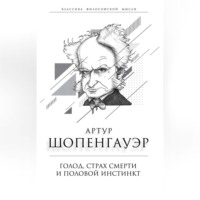 полная версия
полная версияThe World as Will and Idea (Vol. 2 of 3)
The content of the absolute ought, the fundamental principle of the practical reason, is the famous: “So act that the maxim of your will might always be also valid as the principle of a universal legislation.” This principle presents to him who desires a rule for his own will the task of seeking such a rule for the wills of all. Then the question arises how such a rule is to be found. Clearly, in order to discover the rule of my conduct, I ought not to have regard to myself alone, but to the sum of all individuals. Then, instead of my own well-being, the well-being of all without distinction becomes my aim. Yet the aim still always remains well-being. I find, then, that all can be equally well off only if each limits his own egoism by that of others. From this it certainly follows that I must injure no one, because, since this principle is assumed to be universal, I also will not be injured. This, however, is the sole ground on account of which I, who do not yet possess a moral principle, but am only seeking one, can wish this to be a universal law. But clearly in this way the desire of well-being, i. e., egoism, remains the source of this ethical principle. As the basis of politics it would be excellent, as the basis of ethics it is worthless. For he who seeks to establish a rule for the wills of all, as is demanded by that moral principle, necessarily stands in need of a rule himself; otherwise everything would be alike to him. But this rule can only be his own egoism, since it is only this that is affected by the conduct of others; and therefore it is only by means of this egoism, and with reference to it, that each one can have a will concerning the conduct of others, and that it is not a matter of indifference to him. Kant himself very naively intimates this (p. 123 of the “Critique of Practical Reason;” Rosenkranz's edition, p. 192), where he thus prosecutes the search for maxims for the will: “If every one regarded the need of others with complete indifference, and thou also didst belong to such an order of things, wouldst thou consent thereto?” Quam temere in nosmet legem sancimus iniquam! would be the rule of the consent inquired after. So also in the “Fundamental Principles of the Metaphysic of Morals” (p. 56 of the third, and p. 50 of Rosenkranz's, edition): “A will which resolved to assist no one in distress would contradict itself, for cases might arise in which it required the love and sympathy of others,” &c. &c. This principle of ethics, which when light is thrown upon it is therefore nothing else than an indirect and disguised expression of the old, simple principle, “Quod tibi fieri non vis, alteri ne feceris,” is related first and directly to passivity, suffering, and then only by means of this to action. Therefore, as we have said, it would be thoroughly serviceable as a guide for the constitution of the State, which aims at the prevention of the suffering of wrong, and also desires to procure for all and each the greatest sum of well-being. But in ethics, where the object of investigation is action as action, and in its direct significance for the actor– not its consequences, suffering, or its relation to others – in this reference, I say, it is altogether inadmissible, because at bottom it really amounts to a principle of happiness, thus to egoism.
We cannot, therefore, share Kant's satisfaction that his principle of ethics is not a material one, i. e., one which sets up an object as a motive, but merely formal, whereby it corresponds symmetrically to the formal laws with which the “Critique of Pure Reason” has made us familiar. Certainly it is, instead of a law, merely a formula for finding such a law. But, in the first place, we had this formula already more briefly and clearly in the “Quod tibi fieri non vis, alteri ne feceris;” and, secondly, the analysis of this formula shows that it is simply and solely the reference to one's own happiness that gives it content, and therefore it can only be serviceable to a rational egoism, to which also every legal constitution owes its origin.
Another mistake which, because it offends the feelings of every one, has often been condemned, and was satirised by Schiller in an epigram, is the pedantic rule that for an act to be really good and meritorious it must be done simply and solely out of respect for the known law and the conception of duty, and in accordance with a maxim known to the reason in abstracto, and not from any inclination, not from benevolence felt towards others, not from tender-hearted compassion, sympathy, or emotion of the heart, which (according to the “Critique of Practical Reason,” p. 213; Rosenkranz's edition, p. 257) to right-thinking persons are indeed very burdensome, as confusing their deliberate maxims. The act must be performed unwillingly and with self-compulsion. Remember that nevertheless the hope of reward is not allowed to enter, and estimate the great absurdity of the demand. But, what is saying more, this is directly opposed to the true spirit of virtue; not the act, but the willingness to do it, the love from which it proceeds, and without which it is a dead work, constitutes its merit. Therefore Christianity rightly teaches that all outward works are worthless if they do not proceed from that genuine disposition which consists in true goodwill and pure love, and that what makes blessed and saves is not the works done (opera operata), but the faith, the genuine disposition, which is the gift of the Holy Ghost alone, and which the free, deliberative will, having only the law in view, does not produce. This demand of Kant's, that all virtuous conduct shall proceed from pure, deliberate respect for the law and in accordance with its abstract maxims, coldly and without inclination, nay, opposed to all inclination, is just the same thing as if he asserted that every work of art must be accomplished by a well-considered application of æsthetical rules. The one is just as perverse as the other. The question, already handled by Plato and Seneca, whether virtue can be taught, is to be answered in the negative. We must finally make up our minds to see, what indeed was the source of the Christian doctrine of election by grace, that as regards its chief characteristic and its inner nature, virtue, like genius, is to a certain extent inborn; and that just as little as all the professors of æsthetics could impart to any one the power of producing works of genius, i. e., genuine works of art, so little could all the professors of ethics and preachers of virtue transform an ignoble into a virtuous and noble character, the impossibility of which is very much more apparent than that of turning lead into gold. The search for a system of ethics and a first principle of the same, which would have practical influence and would actually transform and better the human race, is just like the search for the philosopher's stone. Yet I have spoken at length at the end of the fourth book of the possibility of an entire change of mind or conversion of man (new birth), not by means of abstract (ethics) but of intuitive knowledge (the work of grace). The contents of that book relieve me generally of the necessity of dwelling longer upon this point.
That Kant by no means penetrated to the real significance of the ethical content of actions is shown finally by his doctrine of the highest good as the necessary combination of virtue and happiness, a combination indeed in which virtue would be that which merits happiness. He is here involved in the logical fallacy that the conception of merit, which is here the measure or test, already presupposes a theory of ethics as its own measure, and thus could not be deducible from it. It appeared in our fourth book that all genuine virtue, after it has attained to its highest grade, at last leads to a complete renunciation in which all willing finds an end. Happiness, on the other hand, is a satisfied wish; thus the two are essentially incapable of being combined. He who has been enlightened by my exposition requires no further explanation of the complete perverseness of this Kantian view of the highest good. And, independent of my positive exposition, I have no further negative exposition to give.
Kant's love of architectonic symmetry meets us also in the “Critique of Practical Reason,” for he has given it the shape of the “Critique of Pure Reason,” and has again introduced the same titles and forms with manifest intention, which becomes specially apparent in the table of the categories of freedom.
The “Philosophy of Law” is one of Kant's latest works, and is so poor that, although I entirely disagree with it, I think a polemic against it is superfluous, since of its own weakness it must die a natural death, just as if it were not the work of this great man, but the production of an ordinary mortal. Therefore, as regards the “Philosophy of Law,” I give up the negative mode of procedure and refer to the positive, that is, to the short outline of it given in the fourth book. Just one or two general remarks on Kant's “Philosophy of Law” may be made here. The errors which I have condemned in considering the “Critique of Pure Reason,” as clinging to Kant throughout, appear in the “Philosophy of Law” in such excess that one often believes he is reading a satirical parody of the Kantian style, or at least that he is listening to a Kantian. Two principal errors, however, are these. He desires (and many have since then desired) to separate the Philosophy of Law sharply from ethics, and yet not to make the former dependent upon positive legislation, i. e., upon arbitrary sanction, but to let the conception of law exist for itself pure and a priori. But this is not possible; because conduct, apart from its ethical significance, and apart from the physical relation to others, and thereby from external sanction, does not admit even of the possibility of any third view. Consequently, when he says, “Legal obligation is that which can be enforced,” this can is either to be understood physically, and then all law is positive and arbitrary, and again all arbitrariness that achieves its end is law; or the can is to be understood ethically, and we are again in the province of ethics. With Kant the conception of legal right hovers between heaven and earth, and has no ground on which to stand; with me it belongs to ethics. Secondly, his definition of the conception law is entirely negative, and thereby inadequate.11 Legal right is that which is consistent with the compatibility of the respective freedom of individuals together, according to a general law. Freedom (here the empirical, i. e., physical, not the moral freedom of the will) signifies not being hindered or interfered with, and is thus a mere negation; compatibility, again, has exactly the same significance. Thus we remain with mere negations and obtain no positive conception, indeed do not learn at all, what is really being spoken about, unless we know it already from some other source. In the course of the exposition the most perverse views afterwards develop themselves, such as that in the state of nature, i. e., outside the State, there is no right to property at all, which really means that all right or law is positive, and involves that natural law is based upon positive law, instead of which the case ought to be reversed. Further, the founding of legal acquisition on possession; the ethical obligation to establish the civil constitution; the ground of the right of punishment, &c., &c., all of which, as I have said, I do not regard as worth a special refutation. However, these Kantian errors have exercised a very injurious influence. They have confused and obscured truths long known and expressed, and have occasioned strange theories and much writing and controversy. This certainly cannot last, and we see already how truth and sound reason again make way for themselves. Of the latter, the “Naturrecht” of J. C. F. Meister specially bears evidence, and is thus a contrast to many a preposterous theory, though I do not regard it as on this account a pattern of perfection.
On the “Critique of Judgment” also, after what has been said, I must be very short. We cannot but be surprised that Kant, to whom art certainly was very foreign, and who to all appearance had little susceptibility for the beautiful, indeed probably never had the opportunity of seeing an important work of art, and who seems, finally, to have had no knowledge of Goethe, the only man of his century and nation who was fit to be placed by his side as his giant equal, – it is, I say, surprising how, notwithstanding all this, Kant was able to render a great and permanent service to the philosophical consideration of art and the beautiful. His merit lies in this, that much as men had reflected upon the beautiful and upon art, they had yet really always considered it only from the empirical point of view, and had investigated upon a basis of facts what quality distinguished the object of any kind which was called beautiful from other objects of the same kind. On this path they first arrived at quite special principles, and then at more general ones. They sought to separate true artistic beauty from false, and to discover marks of this genuineness, which could then serve again as rules. What gives pleasure as beautiful and what does not, what therefore is to be imitated, what is to be striven against, what is to be avoided, what rules, at least negative rules, are to be established, in short, what are the means of exciting æsthetic satisfaction, i. e., what are the conditions of this residing in the object – this was almost exclusively the theme of all treatises upon art. This path was followed by Aristotle, and in the most recent times we find it chosen by Home, Burke, Winckelmann, Lessing, Herder, and many others. It is true that the universality of the æsthetical principles discovered finally led back to the subject, and it was observed that if the effect upon the subject were adequately known we would then also be able to determine a priori the causes of this which lie in the object, and thus alone this method of treatment could attain to the certainty of a science. This occasioned once and again psychological disquisitions. Specially however, Alexander Baumgarten produced with this intention a general æsthetic of all beauty, in which he started from the conception of the perfection of sensuous knowledge, that is, of knowledge of perception. With him also, however, the subjective part is done with as soon as this conception has been established, and he passes on to the objective part and to the practical, which is connected with it. But here also the merit was reserved for Kant of investigating seriously and profoundly the feeling itself, in consequence of which we call the object occasioning it beautiful, in order to discover, wherever it was possible, the constituent elements and conditions of it in our nature. His investigation, therefore, took an entirely subjective direction. This path was clearly the right one, for in order to explain a phenomenon which is given in its effects, one must know accurately this effect itself, if one is to determine thoroughly the nature of the cause. Yet Kant's merit in this regard does not really extend much further than this, that he has indicated the right path, and by a provisional attempt has given an example of how, more or less, it is to be followed. For what he gave cannot be regarded as objective truth and as a real gain. He gave the method for this investigation, he broke ground in the right direction, but otherwise he missed the mark.
In the “Critique of Æsthetical Judgment” the observation first of all forces itself upon us that Kant retains the method which is peculiar to his whole philosophy, and which I have considered at length above – I mean the method of starting from abstract knowledge in order to establish knowledge of perception, so that the former serves him, so to speak, as a camera obscura in which to receive and survey the latter. As in the “Critique of Pure Reason” the forms of judgment are supposed to unfold to him the knowledge of our whole world of perception, so in this “Critique of Æsthetical Judgment” he does not start from the beautiful itself, from the perceptible and immediately beautiful, but from the judgment of the beautiful, the so-called, and very badly so-called, judgment of taste. This is his problem. His attention is especially aroused by the circumstance that such a judgment is clearly the expression of something that takes place in the subject, but yet is just as universally valid as if it concerned a quality of the object. It is this that struck him, not the beautiful itself. He starts always merely from the assertions of others, from the judgment of the beautiful, not from the beautiful itself. It is therefore as if he knew it simply from hearsay, not directly. A blind man of high understanding could almost in the same way make up a theory of colours from very accurate reports which he had heard concerning them. And really we can only venture to regard Kant's philosophemes concerning the beautiful as in almost the same position. Then we shall find that his theory is very ingenious indeed, that here and there telling and true observations are made; but his real solution of the problem is so very insufficient, remains so far below the dignity of the subject, that it can never occur to us to accept it as objective truth. Therefore I consider myself relieved from the necessity of refuting it; and here also I refer to the positive part of my work.
With regard to the form of his whole book, it is to be observed that it originated in the idea of finding in the teleological conception the key to the problem of the beautiful. This inspiration is deduced, which is always a matter of no difficulty, as we have learnt from Kant's successors. Thus there now arises the strange combination of the knowledge of the beautiful with that of the teleology of natural bodies in one faculty of knowledge called judgment, and the treatment of these two heterogeneous subjects in one book. With these three powers of knowledge, reason, judgment, and understanding, a variety of symmetrical-architectonic amusements are afterwards undertaken, the general inclination to which shows itself in many ways in this book; for example, in the forcible adaptation of the whole of it to the pattern of the “Critique of Pure Reason,” and very specially in the antinomy of the æsthetical judgment, which is dragged in by the hair. One might also extract a charge of great inconsistency from the fact that after it has been incessantly repeated in the “Critique of Pure Reason” that the understanding is the faculty of judgment, and after the forms of its judgment have been made the foundation-stone of all philosophy, a quite special faculty of judgment now appears, which is completely different from the former. For the rest, what I call the faculty of judgment, the capacity for translating knowledge of perception into abstract knowledge, and again of applying the latter correctly to the former, is explained in the positive part of my work.
By far the best part of the “Critique of Æsthetical Judgment” is the theory of the sublime. It is incomparably more successful than that of the beautiful, and does not only give, as that does, the general method of investigation, but also a part of the right way to it – so much so that even though it does not give the real solution of the problem, it yet touches very closely upon it.
In the “Critique of the Teleological Judgment,” on account of the simplicity of the matter, we can recognise perhaps more than anywhere else Kant's rare talent of turning a thought this way and that way, and expressing it in a multitude of different ways, until out of it there grows a book. The whole book is intended to say this alone: although organised bodies necessarily appear to us as if they were constructed in accordance with a conceived design of an end which preceded them, yet we are not justified in assuming that this is objectively the case. For our intellect, to which things are given from without and indirectly, which thus never knows their inner nature through which they arise and exist, but merely their outward side, cannot otherwise comprehend a certain quality peculiar to organised productions of nature than by analogy, for it compares it with the intentionally accomplished works of man, the nature of which is determined by a design and the conception of this design. This analogy is sufficient to enable us to comprehend the agreement of all the parts with the whole, and thus indeed to give us the clue to their investigation; but it must by no means on this account be made the actual ground of explanation of the origin and existence of such bodies. For the necessity of so conceiving them is of subjective origin. Somewhat in this way I would epitomise Kant's doctrine on this question. In its most important aspect he had expounded it already in the “Critique of Pure Reason,” p. 692-702; V., 720-730. But in the knowledge of this truth also we find David Hume to be Kant's worthy forerunner. He also had keenly controverted that assumption in the second part of his “Dialogues concerning Natural Religion.” The difference between Hume's criticism of that assumption and Kant's is principally this, that Hume criticised it as an assumption based upon experience, while Kant, on the other hand, criticised it as an a priori assumption. Both are right, and their expositions supplement each other. Indeed what is really essential in the Kantian doctrine on this point we find already expressed in the commentary of Simplicius on Aristotle's Physics: “ἡ δε πλανη γεγονεν αυτοις απο του ἡγεισθαι, παντα τα ἑνεκα του γινομενα κατα προαιρεσιν γενεσθαι και λογισμον, τα δε φυσει μη ὁυτως ὁραν γινομενα.” (Error iis ortus est ex eo, quod credebant, omnia, quæ propter finem aliquem fierent, ex proposito et ratiocinio fieri, dum videbant, naturæ opera non ita fieri.) Schol. in Arist., ex edit. Berol., p. 354. Kant is perfectly right in the matter; and it was necessary that after it had been shown that the conception of cause and effect is inapplicable to the whole of nature in general, in respect of its existence, it should also be shown that in respect of its qualities it is not to be thought of as the effect of a cause guided by motives (designs). If we consider the great plausibility of the physico-theological proof, which even Voltaire held to be irrefragable, it was clearly of the greatest importance to show that what is subjective in our comprehension, to which Kant had relegated space, time, and causality, extends also to our judgment of natural bodies; and accordingly the compulsion which we feel to think of them as having arisen as the result of premeditation, according to designs, thus in such a way that the idea of them preceded their existence, is just as much of subjective origin as the perception of space, which presents itself so objectively, and that therefore it must not be set up as objective truth. Kant's exposition of the matter, apart from its tedious prolixity and repetitions, is excellent. He rightly asserts that we can never succeed in explaining the nature of organised bodies from merely mechanical causes, by which he understands the undesigned and regular effect of all the universal forces of nature. Yet I find here another flaw. He denies the possibility of such an explanation merely with regard to the teleology and apparent adaptation of organised bodies. But we find that even where there is no organisation the grounds of explanation which apply to one province of nature cannot be transferred to another, but forsake us as soon as we enter a new province, and new fundamental laws appear instead of them, the explanation of which is by no means to be expected from the laws of the former province. Thus in the province of the mechanical, properly so called, the laws of gravitation, cohesion, rigidity, fluidity, and elasticity prevail, which in themselves (apart from my explanation of all natural forces as lower grades of the objectification of will) exist as manifestations of forces which cannot be further explained, but themselves constitute the principles of all further explanation, which merely consists in reduction to them. If we leave this province and come to the phenomena of chemistry, of electricity, magnetism, crystallisation, the former principles are absolutely of no use, indeed the former laws are no longer valid, the former forces are overcome by others, and the phenomena take place in direct contradiction to them, according to new laws, which, just like the former ones, are original and inexplicable, i. e., cannot be reduced to more general ones. Thus, for example, no one will ever succeed in explaining even the dissolving of a salt in water in accordance with the laws proper to mechanics, much less the more complicated phenomena of chemistry. All this has already been explained at length in the second book of the present work. An exposition of this kind would, as it seems to me, have been of great use in the “Critique of the Teleological Judgment,” and would have thrown much light upon what is said there. Such an exposition would have been especially favourable to his excellent remark that a more profound knowledge of the real being, of which the things of nature are the manifestation, would recognise both in the mechanical (according to law) and the apparently intentional effects of nature one and the same ultimate principle, which might serve as the more general ground of explanation of them both. Such a principle I hope I have given by establishing the will as the real thing in itself; and in accordance with it generally in the second book and the supplements to it, but especially in my work “On the Will in Nature,” the insight into the inner nature of the apparent design and of the harmony and agreement of the whole of nature has perhaps become clearer and deeper. Therefore I have nothing more to say about it here.









